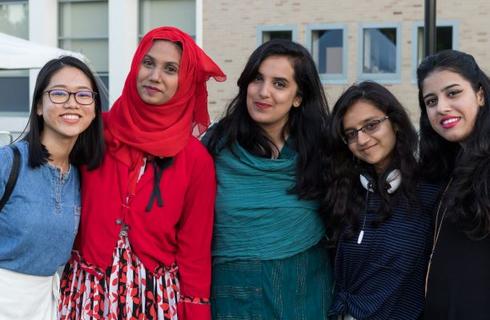Bachelor of Arts in English - Rhetoric and Global Culture

学历文凭
Bachelor Degree

专业院系
English

开学时间

课程时长

课程学费

国际学生入学条件
SAT - 530-640, ACT - 21-27
IDP—雅思考试联合主办方

雅思考试总分
6.5
- 雅思总分:6.5
- 托福网考总分:80
- 托福笔试总分:160
- 其他语言考试:NA
CRICOS代码:
申请截止日期: 请与IDP联系 以获取详细信息。
课程简介
相关申请
 预科
预科 奖学金
奖学金 实习机会
实习机会 在校学习
在校学习 跨境学习
跨境学习 校园授课-线上开始
校园授课-线上开始 在线/远程学习
在线/远程学习
开学时间&学费
学费信息仅供参考,请与IDP联系以获取详细信息
| 开学时间 | 时长 | 学费 | 地点 |
|---|---|---|---|
| 暂无 | 暂无 | 暂无 | 暂无 |
学校排名

世界排名501
数据源:
泰晤士高等教育世界大学排名
本校相关课程

Bachelor of Arts in Political Science
学历文凭
Bachelor Degree
开学日期
课程费用总额


Bachelor of Arts in Africana Studies
学历文凭
Bachelor Degree
开学日期
课程费用总额


Bachelor of Arts in Africana Studies (Honors)
学历文凭
Honours
开学日期
课程费用总额


Bachelor of Arts in Anthropology
学历文凭
Bachelor Degree
开学日期
课程费用总额


Bachelor of Science in Anthropology
学历文凭
Bachelor Degree
开学日期
课程费用总额


Bachelor of Arts in Anthropology/Master of Arts in Anthropology
学历文凭
Combined Baccalaureate and Master's Prog
开学日期
课程费用总额

其他相关课程

Bachelor of Science in Communication Studies
 詹姆斯麦迪逊大学
詹姆斯麦迪逊大学学历文凭
Bachelor Degree
开学日期
课程费用总额


传播与修辞哲学博士
 伦斯勒理工学院
伦斯勒理工学院泰晤士高等教育世界大学排名:554
学历文凭
Ph.D.
开学日期
课程费用总额


Bachelor of Arts in Communication - Speech Communication (Secondary Teacher Certification)
 德克萨斯大学阿灵顿分校
德克萨斯大学阿灵顿分校学历文凭
Bachelor Degree
开学日期
课程费用总额


Bachelor of Arts in Communication Studies - Relational and Workplace Communication
 肯特州立大学
肯特州立大学学历文凭
Bachelor Degree
开学日期
课程费用总额


Bachelor of Arts in Communication Studies
 蒙大拿大学
蒙大拿大学学历文凭
Bachelor Degree
开学日期
课程费用总额


Bachelor of Arts in Writing and Rhetoric
 佩斯大学 - Kaplan International
佩斯大学 - Kaplan International学历文凭
Bachelor Degree
开学日期
课程费用总额











